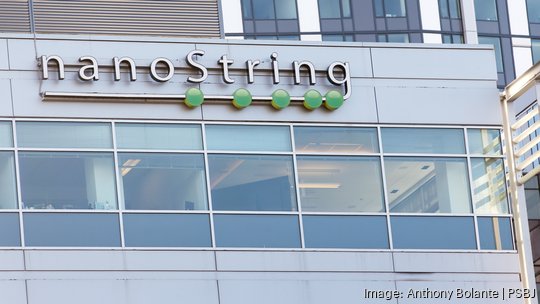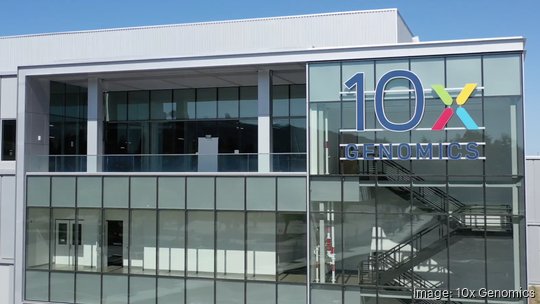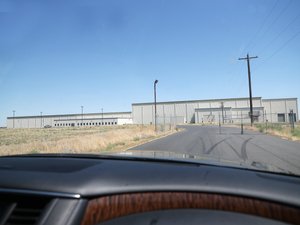
Ongoing legal battles are taking a toll on NanoString Technologies Inc. (Nasdaq: NSTG) as the Seattle-based research device company continues to shed workers.
NanoString on Jan. 5 disclosed layoffs affecting about 50 employees, roughly 9% of its headcount, adding to an October decision to lay off about 20% of its headcount.
Pleasanton, California-based 10x Genomics Inc. (Nasdaq: TXG) has filed patent lawsuits in both Europe and the U.S. against NanoString, which referenced the lawsuits at the time of its October layoffs.
10x on Nov. 17 announced a jury in the U.S. District Court for the District of Delaware found in favor of 10x in a patent lawsuit, awarding 10x more than $31 million in damages. NanoString released a statement saying it plans to appeal the decision, a process that usually takes 12 to 18 months.
NanoString, founded in 2003, makes high-powered, high-tech imaging and research tools. NanoString plans to finish its most recent round of layoffs by the end of March, after which it will have a little more than 500 employees. 10x, which was founded in 2012, also makes imaging tools, as well as software and analysis tools.
10x has sued NanoString in the U.S., Germany and the European Union’s Unified Patent Court (UPC). In September, the UPC issued a preliminary injunction blocking sales of some NanoString products in the 17 UPC countries while the case awaits a full hearing, expected this summer.
"We don't believe we infringe the patents in question, and we don't believe those patents are valid," NanoString CEO Brad Gray said.

Gray said the NanoString revenue flow blocked in Europe represents about 10% of the company’s overall revenue. He added that NanoString’s legal bills are “many millions of dollars,” and that money would otherwise go into product innovation.
NanoString generated $48.1 million in revenue during the third quarter of 2023, up from $29.5 million during the same period in 2022. The company withdrew its fourth quarter and full-year financial guidance after the more than $31 million damages verdict with 10x in November.
10x generated $153.6 million during the third quarter, up 17% year over year.

In 2020, 10x acquired a company called ReadCoor for $350 million, a move that provided 10x with some of the now-disputed patents. ReadCoor spun out from the lab of Harvard researcher George Church, who landed a National Institutes of Health (NIH) grant in 2009.
Church’s application for the NIH grant said “the Church Lab will work with the Harvard Medical School Office of Technology Licensing to obtain open and non-exclusive licenses that will encourage commercialization.” It also said, “we will try to move our technology either into the public domain or non-exclusive licensing mechanisms.”
NanoString has also filed antitrust claims against both 10x and Harvard.
The NIH said in a statement it “does not discuss grant deliberations related to individual recipient institutions, awards, or supported investigators, whether or not such deliberations are underway or have occurred.”
Church’s lab didn’t respond to a request for comment.
10x Chief Legal Officer Eric Whitaker said the technology from Church and ReadCoor represents just a subset of the patents 10x is litigating. He added that the comments made in the NIH application were vague and don’t represent any kind of legally binding promise, and NanoString is not a named third-party beneficiary in the grant, a strict legal requirement in lawsuits involving federal contracts.
Church's NIH grant agreement expired in 2016, according to Whitaker.
NanoString on Jan. 4 received notice from the Nasdaq that NanoString's stock had closed below $1 per share for the past 30 consecutive business days. NanoString has 180 days, or until July 2, to regain compliance by having its stock close at $1 or more for at least 10 consecutive business days. NanoString can appeal if it doesn't regain compliance by then, or the company could qualify for an additional 180 days if it transfers its stock to the Nasdaq Capital Market.
10x also has filed lawsuits against Cambridge, Massachusetts-based biotech Vizgen and Seattle-based biotech startup Parse Biosciences. The suit against Parse alleges patent infringement regarding its gene analysis kits, which 10x has claimed infringe on the company’s single-cell genomics tech. A judge in September rejected Parse’s bid to dismiss the lawsuit.
In a statement, Parse co-founder and CEO Alex Rosenberg said Parse's arguments regarding its existing products scored a recent victory with the Patent Trial and Appeal Board. He added that the remaining claims from 10x “are alleging infringement against future products to measure chromatin in single cells” and Parse is “confident that these future products will not infringe any valid claims asserted by 10x Genomics."








